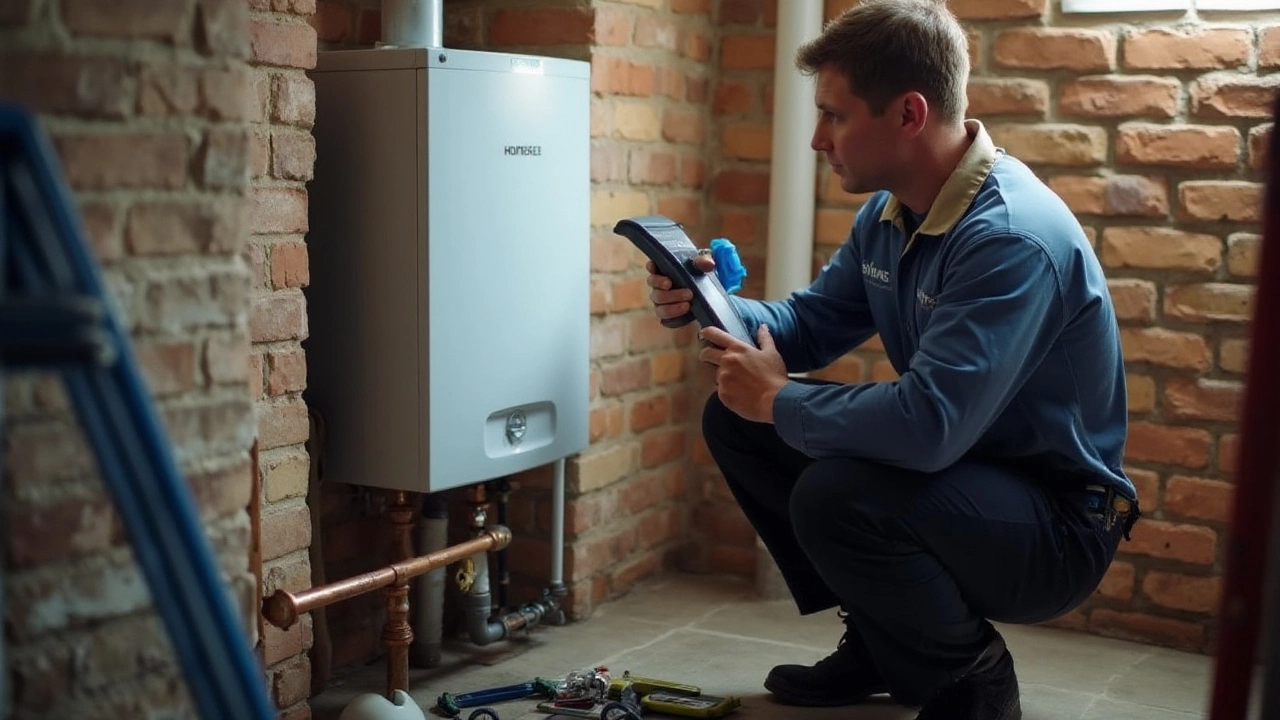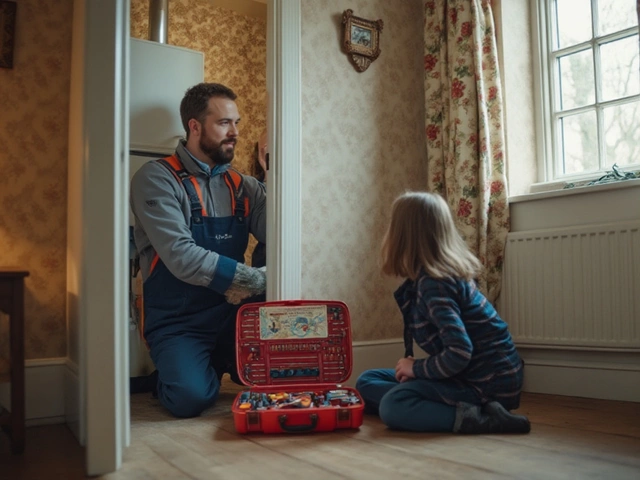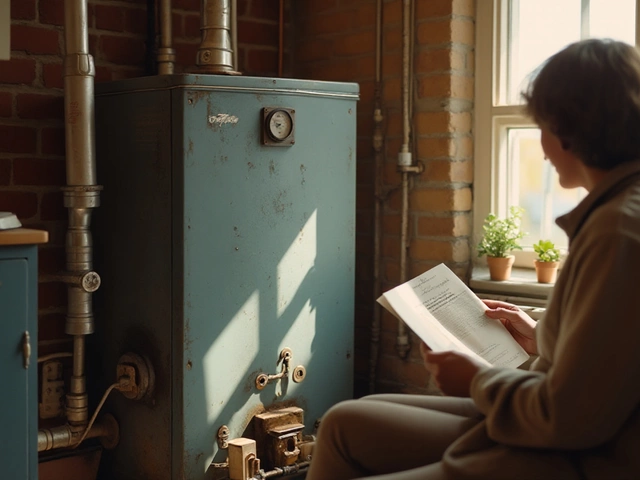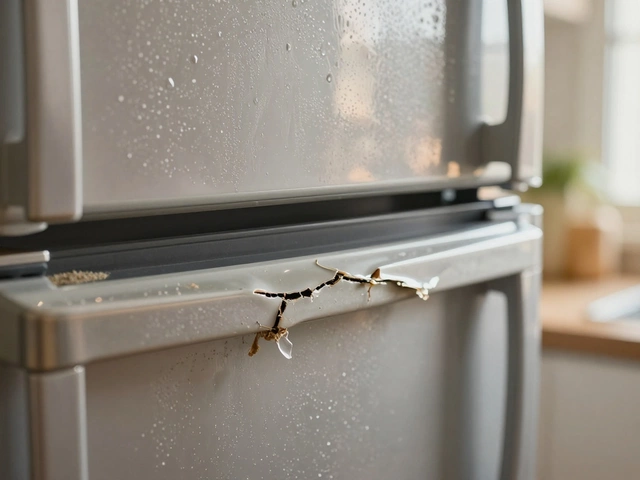When your boiler fails, it often feels like a race against time, especially with a chill in the air. Understanding how long it might take to get your system back up and running can reduce anxiety. While some common issues are swift to address, others may require more time and parts. Knowing the right steps to prepare and what factors contribute to repair duration can make the process smoother.
Exploring the average repair times for typical problems, from minor leaks to a full system shutdown, can guide expectations properly. It also helps to be aware of other influences, such as the availability of replacement parts or the technician's schedule, that might extend this timeline. With a little preparation and the right know-how, your boiler will be back to ensuring warmth and comfort in no time.
- Understanding Common Boiler Issues
- Typical Repair Times Explained
- Factors Affecting Repair Speed
- Preparing for the Technician
- Preventative Maintenance Tips
Understanding Common Boiler Issues
Boilers are complex machines and naturally face their share of hiccups. When it starts misbehaving, life at home can get uncomfortable pretty quickly, leaving folks frustrated and, quite literally, in the cold. The trick is recognizing these common boiler repair issues quickly, which can save time and potentially high repair costs. The sound of a failing boiler can be anything from a faint rumble to an unsettling clunking, each indicating its own type of trouble. These noises aren't just oddities; they're cries for help from your trusty appliance. Getting familiar with these sounds can sometimes cut through the panic and give you a clue about what's happening inside.
Take, for instance, an annoyingly inconsistent heating pattern. This problem often comes down to trapped air in the system, kicking the circulation out of balance. Bleeding your radiators might be the straightforward hack here, a task that's easier than you might assume. On the other end of the spectrum, a loss of hot water or no heating at all could be an indicator of a faulty thermostat or a broken diaphragm. The thermostat, if unresponsive, might need recalibration or replacement, a task best left to professionals for precision. Meanwhile, a faulty diaphragm represents a more significant job, potentially requiring parts on order, which can introduce a delay in the fix boiler time.
Another frequent issue is a leak somewhere within the system. Leakage, while seemingly minor, can point to a bigger underlying issue and should never be ignored. Internal corrosion, a worn pump seal, or a pressure valve giving out could be the culprits lurking beneath the surface. Engaging a professional quickly could stave off the risk of flooding or equipment failure. Low pressure in your system is another sign that things aren’t running as they should. Often, this is due to a loss of water from the system, a point worth investigating for both short-term and long-term boiler maintenance.
It’s interesting to note that the age of your boiler can play a substantial role in these issues. Older boilers naturally evolve their quirks, which might make them more prone to breakdowns. According to research from the Energy Saving Trust, the average lifespan of a boiler is around 10-15 years. Past this mark, their efficiency begins to degrade noticeably. That being said, let’s not assume youth guarantees smooth sailing. Even newer models can stumble, notably if they aren't serviced regularly. Keeping up with annual checkups is crucial in maintaining optimal performance and longevity for your home's heating system.
Meanwhile, poor installations have their role in common issues too. If the original setup wasn't carried out with the precision it deserved, problems could sneak up even in the early stages. Incorrect pressure settings from the get-go can throw off operation efficiency and heat distribution. It’s always wise to ensure that installations are handled by certified professionals. Undoubtedly, getting to the core of these usual suspects requires a bit of sleuthing, but with the right approach, maintaining the warmth of your home year-round could be a good deal simpler.
Typical Repair Times Explained
Delving into how long it takes to fix a boiler repair can demystify the process for homeowners and set realistic expectations. This journey usually starts the moment the boiler goes kaput and you make that imperative call to your trusted technician. Many common boiler issues can be resolved in a brisk time frame, with straightforward fixes generally taking a half-hour or less. This can include tightening a loose connection or resetting a tripped thermostat. However, a malfunction that requires replacement of parts might stretch the timeline exponentially, from a couple of hours to, in unique circumstances, a full day or more.
Some factors come into play that might lengthen the repair process. Complexity of the problem stands at the forefront - diagnosing a simple thermostat issue varies greatly from addressing a broken heat exchanger. Experience and expertise of the repair technician, along with availability of required parts, heavily impacts the service time as well. According to a 2021 study by the Heating and Hotwater Industry Council, 62% of repair times are increased due to a wait for parts. Keep this in mind as your technician may have to order parts unique to older models.
Quirkiness in systems, particularly older ones, adds an adventurous twist to heating system repairs. It’s quite a puzzle-solving expedition. Experienced technicians often revel in such challenges. As James Chichester, a seasoned boiler guru once put it, "Every vintage boiler has its own story to tell - it's up to us to listen carefully and respond promptly."
Thus, setting accurate expectations calls for candid dialogue with your technician. Ask about anticipated timelines. Don’t shy away from negotiating timeframes for exceptional situations like weekend repair needs. Communication is key.
Of course, not all problems are big fixes. Some, like minor leaks or vent blockages that just need a bit of thorough cleaning, can be addressed quickly without waiting for spare parts. For the proactive homeowner, staying informed on typical repair times aids in planning and preparing, ensuring a smoother process. Here’s a helpful list of common repairs and expected timeframes:
- Boiler pressure issues: 30 to 60 minutes.
- Thermostat malfunctions: Often resolved in under an hour.
- Heat exchanger replacements: Typically requires 2 to 3 hours.
- Blocked vents or pipes: Usually a 1-2 hour task.
- Circulation pump failure: 1.5 to 3 hours, depending on access.
Being aware of these nuances not only prepares you for what is to come but also empowers you to engage proactively with your service provider, ensuring a swift and effective resolution to your boiler woes. Remember, good maintenance habits can vastly mitigate repair time, turning an unexpected breakdown into a mere bump in the road.

Factors Affecting Repair Speed
When it comes to getting your boiler repair done quickly, various factors come into play that can significantly impact the repair timeline. One of the most crucial factors is the severity of the problem. Minor issues like a misfiring pilot light or a faulty thermostat can be addressed relatively swiftly, often within a few hours. On the other hand, more complex problems, such as a major part failure or a significant leak in the system, might take days to resolve depending on the parts availability and the complexity of the repair. The skill and experience level of the technician can also play an essential role in how quickly the repair work is completed. A seasoned expert may diagnose and fix a problem much faster than someone who's less experienced.
Another factor to consider is the availability of replacement parts. Often, the age and model of your boiler will affect whether parts are readily available or if they need to be ordered specifically for your repair, which can extend the waiting time. In some cases, boilers that are older or less common require special order parts that could take several days to arrive. This is why having adequate communication with your service provider about part availability and expected timelines is vital from the outset. Weather conditions and seasonality also influence repair speed. During peak winter months, service providers may have higher demand due to frequent boiler issues, which could delay the availability of a technician. It's always a good idea to schedule regular maintenance before winter sets in to avoid long wait times.
The size of the company you are dealing with can also affect how quickly your issues are resolved. Larger companies may have a more extensive network of technicians that can be dispatched more rapidly, while smaller outfits might have scheduling constraints that prolong the repair process. It's essential to ask about the expected timeframes when you book a service call. The size and layout of your home can also impact repair times. Some systems are easier to access and service than others, depending on where they are located. For instance, boilers tucked away in basements or hard-to-reach areas may pose accessibility challenges and thus require more time to examine and repair. Feedback from past customers can offer insights into how efficiently a service provider handles repairs; it's always beneficial to research or ask around before settling on a repair service.
Quotes and Insights
"The average service call response time is affected by the number of active technicians and the severity of the problem," says John Cooper, a reputable heating system specialist. "Understanding each element contributing to repair time helps set realistic expectations for homeowners."
Understanding these potential delays and planning accordingly ensures that you're not left in the cold, literally. Being proactive by having a maintenance schedule and knowing the service providers in your area could save time in an urgent situation. Keeping lines of communication open with your selected repair service and discussing details in advance will also help mitigate unexpected setbacks. The better prepared you are, the less stress you will experience when waiting for your heating system to get back into proper working order. Simple measures such as these can turn a potentially stressful situation into a manageable one, which is particularly comforting during colder months when a functioning boiler becomes indispensable.
Preparing for the Technician
When the boiler acts up, making sure you're ready for the technician's visit can save precious time and stress. Having a plan in place is essential to ensure a smooth repair process. Begin by clearing any clutter around the boiler. Many homes have boilers tucked away in basements or utility rooms, sometimes behind boxes or seasonal equipment. Keeping the area around the boiler clear will help the technician access the equipment quickly and diagnose the problem without unnecessary delays.
Knowing the specific model of your boiler and its age can also expedite repairs. Different models have different quirks and component layouts, so having this information handy can help the technician bring the right tools and parts. You can usually find model numbers on stickers or plates attached to the boiler itself. For even smoother communication, make a list of any unusual noises or behaviors that you have noticed leading up to the issue. This provides the technician with valuable clues and can speed up the diagnostic process.
It's a smart move to have any warranties or documentation related to past repairs on standby. This not only helps in understanding if any parts are still under warranty but also gives the technician insight into previous issues that might be related to the current problem. It's like piecing together a family history, giving context to what might be plaguing your boiler now.
Don't forget about scheduling. It might seem minor, but making sure you're available when the technician arrives matters. If you need to leave during the repair, ensure someone else who knows the boiler's background is present. This avoids interruptions and keeps the repair moving forward efficiently. Consider scheduling visits during times when any heating system downtime won't disrupt your daily routine significantly. A chilly living room isn't ideal, but a kitchen out of commission could be disastrous.
If possible, make a list of questions to ask while the technician is there. It’s your chance to learn a bit about what caused the issue and how to prevent something similar in the future. Technicians are usually more than happy to share maintenance tips or explain which issues are common with certain types of boilers.
According to the Energy Saving Trust, 'Regular servicing of your heating system will keep your boiler running smoothly and efficiently, helping save on unnecessary repair costs.'This advice is golden for anyone looking to avoid future headaches and keep their heating bill in check.

Preventative Maintenance Tips
Maintaining a boiler might not be the most glamorous task, but it’s integral to ensuring your heating system stays in tip-top condition. Even if you’re not mechanically inclined, there are some straightforward tips you can follow to prevent major breakdowns. By dedicating some time to routine checks, you not only spare yourself from unexpected interruptions but also extend the lifespan of your heating system.
Start with a regular inspection of your boiler system. Look for any obvious signs such as leaks, strange noises, or unusual odors. These can be early indicators that parts might need attention. When inspecting, also make sure that the area around your boiler is kept clear and free from dust, dirt, and debris. This can help the equipment breathe better, especially during the colder months when it’s working overtime.
Another important aspect of maintenance involves checking the pressure gauge. Boilers operate most efficiently at a certain pressure range, usually between 1 and 1.5 bars. If the pressure is too high or too low, it could indicate a problem with the pressure relief valve or that the system needs bleeding. Knowing how to safely adjust this yourself can save time and possibly an unnecessary call to a boiler repair technician.
Scheduling Annual Servicing
A key preventative tip is to schedule a yearly service by a qualified professional. This isn’t just a good idea; it’s often a warranty requirement. A technician will perform a thorough inspection, cleaning components like the burner and the heat exchanger, ensuring everything is operating correctly. Regular servicing can detect minor issues before they escalate into bigger, more costly problems.
"Annual servicing is your boiler's best friend, keeping it efficient and safe," says Mike Thomas, a heating engineer with over 20 years of experience. "It's like a health check-up but for your system."
Aside from the cleaning process, annual servicing checks flues and ventilation to ensure your boiler operates safely and is compliant with safety regulations. A professional can also provide personalized advice about your specific boiler model, which might include software updates for modern units.
Smart Thermostat Installation
Consider integrating a smart thermostat with your boiler maintenance routine. These devices make regulating your home heating easier and can be wired directly into your system. They offer insights into your energy usage and can help you set schedules to optimize heating, saving money on energy bills. Smart thermostats can even diagnose minor issues on their own, alerting you to potential problems before they worsen.
Finally, a rather ingenious tip is to keep a record of your boiler’s performance. Whether it’s digital or a simple notebook, track any maintenance actions taken, parts replaced, or even abnormal events. This can provide invaluable information over time and assist technicians during their checks, speeding up the diagnosis of issues.
To efficiently handle your boiler and ensure it serves you well through winter months, preventative steps are the way to go. With just a little proactive care, you can save yourself from the stress of unplanned boiler repairs and keep your home warm and cozy without interruptions.







